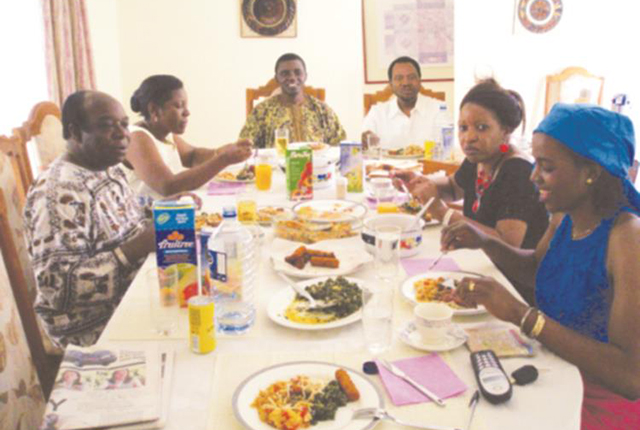The challenge of cultural adaptation, lifestyle change


Most Africans enjoy Western dishes and the use of cutlery, but Europeans are not so keen on taking meals the African way
Sekai Nzenza On Wednesday—
During the weekly prayer gathering, the pastor’s wife, Mai Mufundisi, teaches lifestyle changes to young women. She tells them that the church’s role is not only to help them grow spiritually, but to provide education to young women like my niece Shamiso who has not been exposed to new Western ways of living.The world is changing, says Mai Mufundisi.
What if you are invited to America and hosted by a family then you discover that you have never used a fork and knife before?
What if you have never eaten soup, sea food or dessert?
You must learn about lifestyle and change because we no longer live in the village where you learnt to cook, grind, pound, weed, plant, fetch water, find firewood and perform many duties just by observing.
Gone are the days when your aunt or Tete taught you to be a good wife in the kitchen and in the bedroom.
Such knowledge is now left to the Internet, television, the radio or social media.
A progressive church’s role therefore is to fill in the knowledge gaps and teach young women how to adapt to lifestyle changes.
Mai Mufundisi also said that in the old days our ancestors wore nhembe or leather pieces.
Then they adapted to dresses and trousers. They stopped using sleighs and moved to scotch carts.
Grinding mills replaced grinding stones. We travel on aeroplanes across the world these days.
Culture is not static.
We must learn to move with culture in the way we eat, dress, talk, dance and even the way we fall in love and get married.
I have not met Mai Mufundisi, but I have seen a photo. Shamiso has a photo of Mai and Baba Mufundisi as profile on her phone.
Mai Mufundisi is beautiful.
She stands next to her tall husband, wearing a colourful orange and purple West African or Nigerian costume and headgear.
She smiles to the camera while he husband maintains a gentle but serious purposeful look.
He is clean shaven, wearing a blue shirt with a white collar, his right arm around Mai Mufundisi’s shoulders. They both look young, in their late 30s or perhaps, early 40s.
Shamiso said Mufundisi went to Bible School in America and that is where the parent church is.
During his last visit to America, Mufundisi attended a Donald Trump rally because his hosts were Trump supporters. Back here in Zimbabwe, Mufundisi prayed hard for Trump to win. Before the weekly prayer and lifestyle change seminar last week, there was celebration at Baba na Mai Mufundisi when Trump won.
After the celebration, the weekly seminar focused on teaching women how to host guests for dinner at home.
Mai Mufundisi printed out a few recipes and gave them to young women.
She taught them how to set a table showing them where napkin, knife, fork, soup spoon, dessert spoon and wine glasses sit.
She then asked each one of them to go and cook Western dishes, invite some relatives, vasingakuseke, those who will not laugh at you.
Because Shamiso lives in a one room with Philemon in Chitungwiza, she requested to spend a couple of days at our cousin Reuben’s house in Borrowdale.
With a big fridge and stove, the house was a perfect place for Shamiso to cook the Western dishes and serve them.
Together with cousin Mutsa, the two young women were given money to go shopping on Sunday morning at Sam Levy’s Village. Mutsa is the 20-year-old niece educated by Reuben and his wife.
They rescued her from an early marriage within the John Marange church. She is re writing two ‘O’ Level subjects and stays with Reuben sometimes, goes back to the village at times or visits other relatives in Kwekwe.
When Mutsa decided to move into Reuben’s house without being invited, there was a lot of talk within the family. Reuben’s wife in Australia advised that it really was not safe for a young girl like that to live in the same house with a man whose wife was away.
Some people in the family joked saying it was not possible for a hyena to share the same house with a goat. Kugarisa bere mumba imwechete nembudzi.
The goat will be eaten for sure. Since then, the “goat” comes to visit the “hyena” when there are other people around. Reuben finds this euphemism or metaphor where he is compared to a hyena very offensive. We often avoid the subject when he is present.
We are now gathered at the big teak dining room table with eight chairs.
Plates, forks, knives, spoons and napkins are laid out for eight people although it’s only six of us.
Among the guests are Piri, Reuben, Philemon and Milton, Reuben’s friend from the UK, who wants to take a tour of Reuben’s house and get a few ideas about building a house in Zimbabwe when you have been out of the country for a long time.
We do not know what we are going to eat except that it is all going to be English style. There will be no mazondo, the trotters, and no nyama nemuriwo, meat mixed with vegetables and no sadza either. No derere, mufushwa, muboora, sadza rezviyo or chimukuyu chine dovi. Nothing like that.
The first dish to arrive is thick pumpkin soup.
Piri refuses to touch it, saying it looks like baby food.
She sits and watches us eat. One after the other, Mutsa and Shamiso place various dishes on the table.
Piri quickly opens each of them.
The dishes contain fried pork chops, fried chicken, boiled potatoes, rice, coleslaw and peas.
Shamiso then brings another big bowl of stewed oxtail mixed with carrots, tomatoes, peas, celery and some dry twigs.
“Shall we pray?” Shamiso says.
We all close our eyes and listen as Shamiso makes this long prayer, speaking in Shona and English very quickly.
“Guys, I cannot believe this! This is the stuff I eat in the UK all the time. Why prepare such an English feast in Zimbabwe? I was expecting sadza and mazondo,” says Milton.
“Ehe, tell them Bhudhi Milton. Why are we being forced to eat this food today? Just look at the oxtail. It has carrots? Why kill the soup of an oxtail stew by adding carrots? Ha?” says Piri.
“Let’s just eat first before we begin to complain. There is nothing wrong with variety. We must learn to adapt to various foods, customs and lifestyles,” says Reuben.
We serve ourselves. Halfway during the meal, Shamiso stands up to make a speech.
“Ladies and gentleman, I have invited you here today because I seek to learn how to cook Western dishes.
“One day, I will be asked to entertain people from around the world and how embarrassing that will be, if I cannot use a fork and a knife.”
“What does it matter?” asks Piri. “What is wrong with your hands?”
“Sis, Shamiso is right, we are talking about adaptation here. Over the years, I have learnt that we Africans are very good at adaptation and we can fit into any environment. In this world of change, we must adapt,” says Reuben.
Milton ignores the forks and knives. He picks the chops with his hands, totally ignoring the table etiquette expected of him. Shamiso is horrified. “You are the one from the UK and yet you eat like an uneducated person,” she complains. But Milton simply laughs at her, saying when in Zimbabwe, he looks forward to eating real Zimbabwean traditional food with his hands.
“You talk as if it’s that easy to adapt and change lifestyles. Living in the Diaspora, we have struggled to adapt to their environment so we can be more European and be accepted. But when I am here, I do not want to be subjected to being European all the time. I want to be more African,” says Milton.
“Why do you want to be more African when you are an African already?” asks Shamiso.
“We should learn more about how Europeans live because we will never go back to what life was like in the village. One day, our lifestyles will be more American, I tell you. ”
“Saka murungu anoita adapt papi pacho? Chirungu chamunotambura nacho ndechake, tie dzamunosunga kunopisa ndedzake, even vhudzi ratinosungirira mumusoro medu, nderake. Isu chete tisu tinonzi adapt. What about varungu vacho?” asks Piri, meaning we Africans are continually being asked to adapt and copy Western lifestyles and yet Europeans do not adapt to our styles.
Why?
Piri chews on her chicken bone more vigorously, throwing all her bones back on to the plate.
Shamiso looks on in dismay, as she struggles to cut a pork chop with knife in the left hand and fork in the right hand.
I move over to help her.
I know I have been through this learning experience before, when I too left the village and was invited to a big dining room table like this.
I show Shamiso how to hold her fork and knife properly to cut the pork chop. I tell her that lifestyle is also about adaptation and learning to balance the differences between cultures. There is a middle ground somewhere.
Dr Sekai Nzenza is a writer and cultural critic.







Comments